For our latest local business profile, we chatted with Nectarios Charitakis who is the CEO and Founder of uCarenet, an app that aims to transform access to senior home care in Canada.

What is your business called and what does it do?
The business is called uCarenet and we’re transforming access to senior home care across Canada with a one-of-a-kind app called Caremap. Rather than defaulting to, ’I need to call an agency,’ we’re making it possible for people everywhere to ask, ’What’s the best way to get affordable home care and customize a care plan to my family’s budgetary needs and requirements?”
We’re doing this by building a connected community where people can come together to help each other à people helping people! How? Through our innovative MATCH platform (Marketplace for Accessing Trusted Care at Home), families are finding the customized care they need, and providers have the flexibility to work when, where and how they want to. The end result is a more personalized, efficient and productive system for senior home care across the country. Now families and providers can have real-time access and peace of mind with Caremap and its wellness meter function. No more guess work, miscommunication, or lack of information. No more feeling as though you’ve entered a black hole after you hire a professional to care for your ageing family member.
Caremap’s Wellness Meter provides on-demand access to everything you need to know about the care a family member is receiving, improving collaboration between family and care provider.
What made you start this business?
My personal experiences helping my parents with their journey of healthy ageing and wish to continue to live in their home and community, with quality of life and dignity. I was working abroad and found myself constantly returning home to address issues related to my ageing parents’ care. These were everyday problems, such as finding healthcare workers that were a fit for my parents in their home, that didn’t charge a hefty fee. My family was challenged and despite our bruises we got through it, we were all strong (#strongforfamily). I simply don’t want other families to experience our hardships and pain. More importantly I do not want our seniors to age with fear and isolation. I saw that in my parent’s eyes. It breaks my heart.
I started sharing my challenges with colleagues and friends and realized there was no national, cultural, or income boundaries to the challenge. Everyone was either directly affected or knew of someone affected by caring for an ageing family member or friend. The commonality I found was that many people preferred home care to any other option. There was an intrinsic appeal to the term home care that caught the imaginations of politicians, professionals and the public, especially the ageing public. Home is where the heart is. A place of emotional and physical associations, memories and comfort; and home care offers the possibility to receive a wide range of cost effective services in one’s familiar surroundings.

After my mother and father were robbed twice by care providers, I realized something had to change. That’s how our site and app, which I compare to an online marketplace, was born. Everything we’re trying to do is keep people in their home, keep them out of publicly funded long-term care facilities and keep them out of unneeded emergency room visits. We’re looking to replace antiquated, manual processes to facilitate both collaboration and communication between healthcare providers and families. And help everyone enter into the 21st Century.
Being Greek and having lived in Italy and Greece it became clear to me that a close-knit community life was important, and that in the past, the village took care of you. Now we need to build the 21st Century Digital Village.
uCarenet’s vision for the future isn’t technology dominated, but rather a hybrid between modern tech and the human connection. Everybody’s trying to solve this problem only with technology. I’m of the opinion you can’t give an 80-year-old person a robot and say, ‘This robot is going to help you get dressed.’ For me, the vision of 21st century home care is the ability to merge loving, nurturing, caring people – the human touch – with technology. Combining the two of them to provide 24/7 care at home. That’s what we are building and within the next 90 days we will be piloting two additional e-health solutions with one of Ontario’s largest hospitals.
What problem does this solve?
We look to solve three problems, access, affordability, and transparency. Empowering seniors to age gracefully in their homes. The problem is that when the elderly who can no longer care for themselves wish to age in their homes, their adult children need to find and manage qualified, reliable, and trustworthy services required for their parents to age well, with dignity and quality of life, in the comfort and security of their home. But the resources available to the modern-day adult child to find resources, and for caregivers to market their services, are flawed.
Who are your clientele/demographics?
Ah ha, good question. The ‘sandwich generation’ on both sides of the equation, both the demand side (families) and supply side (care providers, both volunteer and paid). Although the services are arranged for and delivered to a senior, for the most part, our services are targeted to your 40+ year old who is caring for and supporting their children while providing care and support to an ageing family member or friend.
On the supply side we target both accredited (Personal Support Workers, Homecare Aides, etc.) who are either looking to work independently or are looking to add extra shifts and earn extra income. We also work with non-accredited care providers (both paid and volunteer companion keepers) who are looking to earn extra money while their children are in school. What’s important is our vetting process. Not only do we make it easy and inexpensive for care providers to get their background check (both Police and Vulnerable People), we also provide for customer ratings.

How does your business make money? How does it work?
Another good question and an important one. Our premise is: by hiring direct and cutting out the middleman, families can save thousands every year, while care providers can simultaneous earn and higher wage. We’re working to maximize our social impact. By this I mean we are working to democratize homecare and this starts by providing access to information and resources.
So, we do not charge for joining our platform (either via web or app). We do not charge any fees for families to post their care needs or to contact and hire as many care providers as they want. Neither do we charge care providers for posting their profile, limit their client interactions, or take a percentage of their wage. Participation and engagement is free. As a business man, I believe that a business needs to make money where it adds the highest value and has the greatest uniqueness in service. To me, providing a platform where the community can meet and exchange ideas, find work or hire care providers is the least common denominator and this should be free. We need to solve this problem.
Where we do make money is on the premium version of our app. Caremap and its Wellness Meter enables collaboration between family members and care provider, with daily updates on their family member’s physical and emotional wellbeing. In addition, Caremap also provides a suite of small business management tools like appointment tracking, earnings monitoring, invoice generation, expense recording and client history.
Where in Toronto can we find your profession?
You can find us online at www.ucarenet.com or download Caremap from the app store. But remember we’re a new community platform, recruiting across Ontario, and soon across Canada. As the community grows, you will eventually find connections within your area.
What is the best question a prospective customer could ask a member of your profession when comparing services?
Is the information mine? Do I control my service history and data records or are they tied into your app, your company? What do I mean? In keeping with the theme of democratizing information, Caremap is a 100% standalone app, it does not tie you into uCarenet’s platform. Families can use Caremap even though they never hire a care provider through the platform. They don’t have to! Caremap is a tool to better manage and monitor the delivery of care, and to keep track of the emotional and physiological condition of a family member. Families can still use Caremap functions if they find a care provider elsewhere.
The same thing applies with care providers. They can use our app and its small business tools to build their own client base, effectively manage their business and differentiate their service offering within the industry. Even if their clients are not on the platform.
What is the best part about what you do? What is the worst part?
Work with smart enthusiastic people who spend time imagining and creating how to make things better. When I first started my journey as an entrepreneur, experienced entrepreneur friends told me ‘it’s one step forward, two steps back’. The hardest part is learning that sometimes it is not only one step back LOL.
What is your favourite jokes about your own profession?
When asked how I sleep as a founder of a start-up in my 50’s. I say just like a baby. I wake up at night and cry.
PAY IT FORWARD: What is another Toronto business that you love?
This is not a business it’s a non-profit. But I love the work that Tracey Robinson and team of the Home Hospice Association. Tracey is working to build a virtual palliative care community. They work with local chapter heads to empower communities to provide quality end of life care and support for anyone, of any age, at any time; under any roof.
At the end of the day it’s all about community. You know what they say, ‘Build it and they will come’. Well we built it and we’re calling on all Ontarians to come together and lend a hand to help solve this crisis and keep seniors out of hospitals. For people to find work, and for families to find the help they need.
For more information on uCarenet, visit their website.




